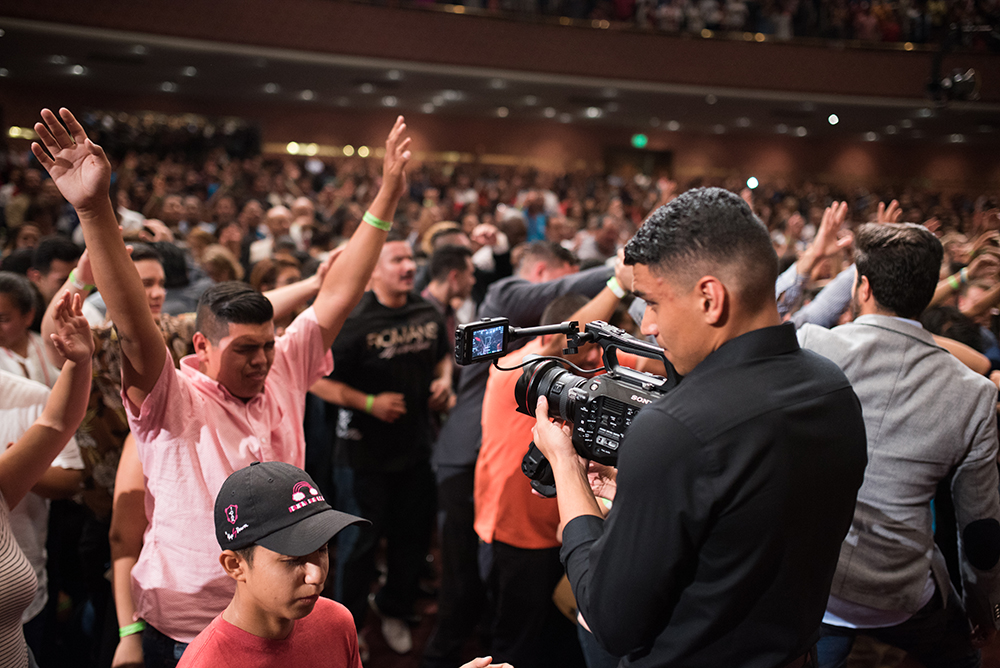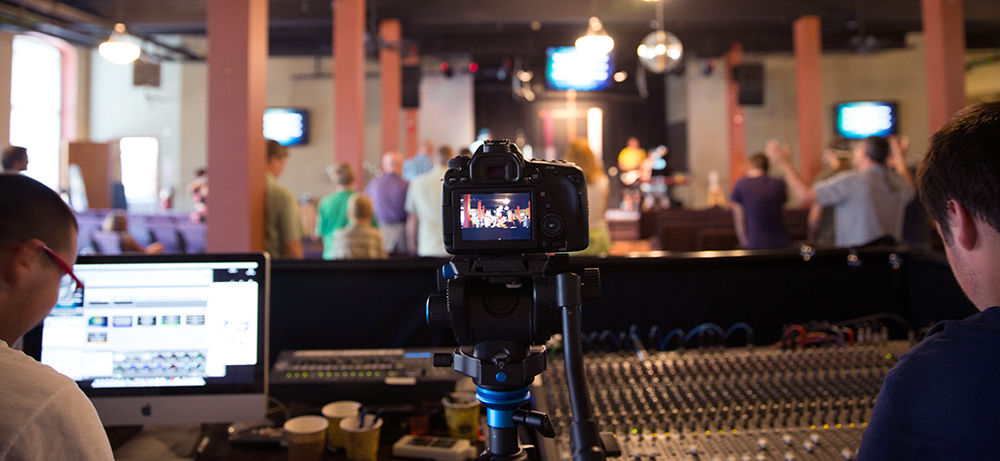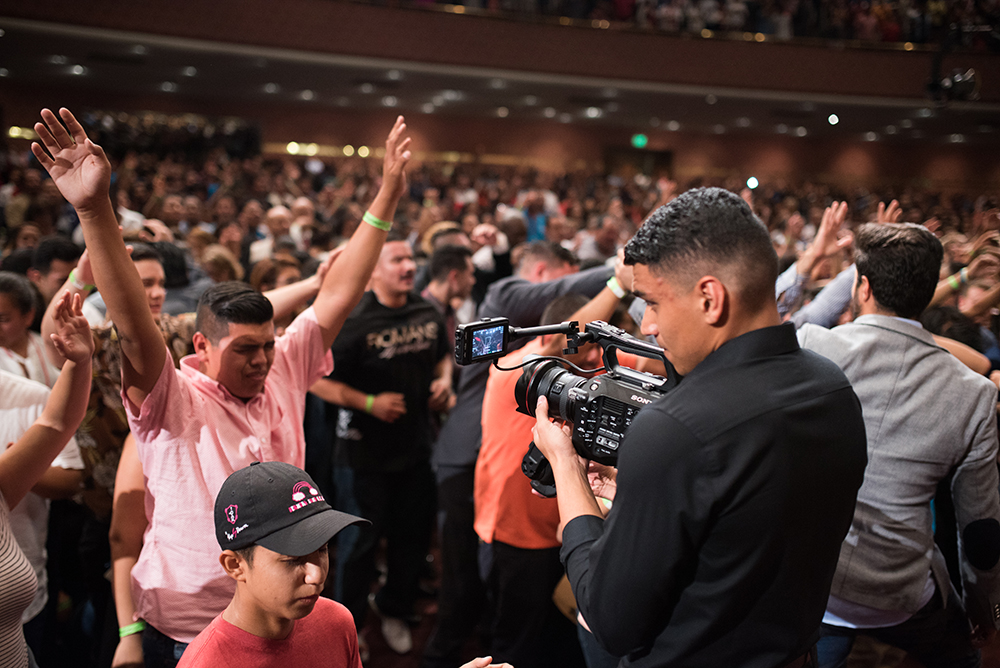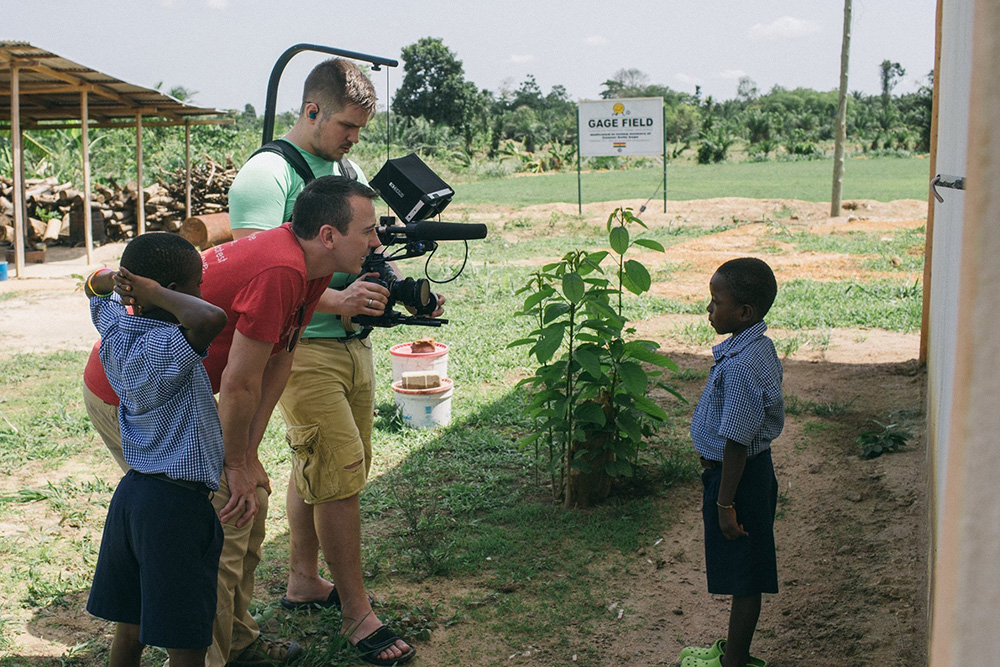
By Meg Tetrault
 Renting camera equipment doesn’t make sense for every church — it’s something we’ve learned as a national rental company that ships gear directly to customers.
Renting camera equipment doesn’t make sense for every church — it’s something we’ve learned as a national rental company that ships gear directly to customers.
For other churches, however — whether they’re just starting out in media or already managing a large-scale A/V ministry team — it actually makes more sense to rent.
Is this your church?
You want people to connect with the message you’re delivering, no matter where they live — but, budget limitations and shortage of knowledge about available technology always seem to get in the way. It leaves you with the questions of: What gear should we buy? and Is there a piece of gear that is better suited for what we want to do?
 Being in charge of a budget is never easy. And when it deals with purchasing camera equipment for media production, it can agonizing. Quality cameras, lenses, lighting, microphones and support devices all contribute to a higher-quality production. The better your production value, the easier it is for viewers to remain ‘in the moment’ and experience the powerful journey visual media can provide.
Being in charge of a budget is never easy. And when it deals with purchasing camera equipment for media production, it can agonizing. Quality cameras, lenses, lighting, microphones and support devices all contribute to a higher-quality production. The better your production value, the easier it is for viewers to remain ‘in the moment’ and experience the powerful journey visual media can provide.
The major hurdle for most churches is finding a way to invest the capital to build even a basic gear package. Even churches with more established budgets for equipment can struggle with how to best allocate their resources. In both situations, renting equipment — in whole or in part — is a lesser-known, often overlooked option.
Here are four ways in which renting A/V equipment might represent a better stewardship proposition for your church.
#1: It raises production value. Spread the same message in an interesting and meaningful way.
 If you’re just starting out in video production, the cost up front to acquire the even a basic camera & lens setup can be cost-prohibitive. For instance, the retail cost of the gear in our basic interview package totals close to $11,000. That’s one camera, one lens, a microphone and some lights.
If you’re just starting out in video production, the cost up front to acquire the even a basic camera & lens setup can be cost-prohibitive. For instance, the retail cost of the gear in our basic interview package totals close to $11,000. That’s one camera, one lens, a microphone and some lights.
Now, scale that up to cover something like your average worship service with three-to five cameras, and you can see how the numbers snowball.
As a rental, however, the basic interview package could cost as low as $700.
When you’re renting, the advantage is that you can shoot on much higher-quality equipment right from the start. You don’t have to compromise the quality of your production based on the limits of your budget.
Renting even allows you access to specialized tools, like “gimbals” or “jibs,” which let you move cameras in unique ways — much like you’d see in a Hollywood movie. However, the impact this equipment on the perceived quality of your content will help to keep your audience engaged and spread the reach of your message.
#2: It lets you stay up to date on technology. With the right gear, your message can reach far beyond the church walls.
If there’s one thing we know about camera technology, is that it’s bound to go out of date. In today’s market, a camera has a lifespan of three to five years, tops. It’s a full-time job to stay on top of the latest equipment releases. There’s a lot of hype to sift through, but some improvements provide real, tangible solutions and benefits for your church’s productions.
The problem is, it costs a fortune to upgrade if you’re constantly chasing new features. In fact, you might never get a positive return on your investments if you’re always acquiring new gear. This is why most high-end commercial production companies try to avoid owning gear at all. They rent because it allows them to choose the best tools for every shoot.
When you rent, it puts the onus of buying and maintaining new technology on someone else. Your production team also stays excited because they get to learn how to use the latest tools or make production run more efficiently.
#3: You can document mission trips. You’re serving communities around the world — let your own community see this work.
 There is no better use of photo and video content than documenting the hard work done on mission trips. The content you produce there will bring many to places they will never see with their own eyes.
There is no better use of photo and video content than documenting the hard work done on mission trips. The content you produce there will bring many to places they will never see with their own eyes.
Despite the powerful impact this kind of production can have, the actual process of shooting overseas can be more complicated than it seems. The task of getting gear safely from one country to the next can be a challenge when an airline is involved. Just look at the changes to restrictions and baggage fees. What a nightmare!
To add to this, the equipment you own or are accustomed to using here in the States might be a terrible solution overseas. Weight, size and portability are big concerns if you’re forced to carry your gear in a backpack to get around.
Limited access to power and computers will place a newfound importance on those batteries and memory cards you take for granted. There are also some countries that even levy a tax on the retail value of any gear you attempt to bring in. This is when renting gear might make sense, as it allows you to tailor your setup without making an investment in items you wouldn’t use back home.
King Jesus International Ministry in Miami, FL, is a good example of how using rented camera equipment can benefit mission work conducted abroad. According to Francisco Guadamuz, the church has traveled to more than a dozen countries in the past five years, relying on rented equipment. Guadamuz says his organization has enjoyed “the best gear and customer service” during that time, and that LPTG has been” a part of the church’s story-telling and capturing the supernatural power of God throughout the world.”
#4: It ramps up the impact of your most important, impactful special events & holiday celebrations. Holidays bring your largest gatherings. Capture these celebrations to share with audiences near and far.
Covering special events usually presents new logistical challenges for your production team. Even if you own the gear you need for your day-to-day productions, large events and holidays can tax your resources. Sometimes you just need an extra camera for more complete coverage. Renting allows you to flex your production to meet any size event.
Another example might be a candlelight vigil where low-light performance is key. The solution would be to rent the fast, expensive prime lenses that don’t make as much sense for your productions on a daily basis.
The beauty of renting is that it can be a total solution, or just a supplement.
What your church is sharing is important. How you share it is, too! That’s where camera equipment rental comes in.
Meg Tetrault is the Marketing Director with Concord, MA-based LensProToGo, a national rental company that ships gear directly to customers. LensProToGo works with more than 70 churches around the nation, providing them with gear technical support. For more information on why rentals might be a good route for your church — and to receive $50 in Gear Credits to get started – visit http://gear.lensprotogo.com/renting-gear-for-your-church. While you’re there, you’ll find several more, in-depth articles on the points outlined above … and more!



It’s interesting when you said that renting a camera and lighting equipment could enhance the value of your production project. A couple of days ago, my best friend told me she and her business associate were looking for a movie production lighting rental that would offer a grip and a camera for different angles for their business production movie. I like this informative equipment article. I’ll tell her that consulting a well-known movie production lighting rental service can help provide facts about the process.